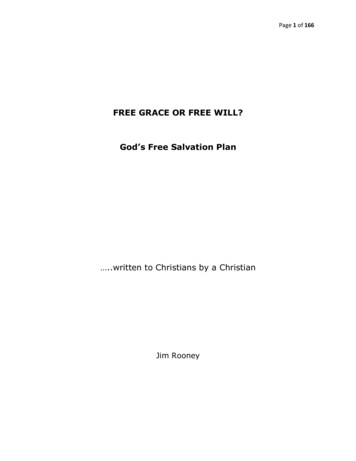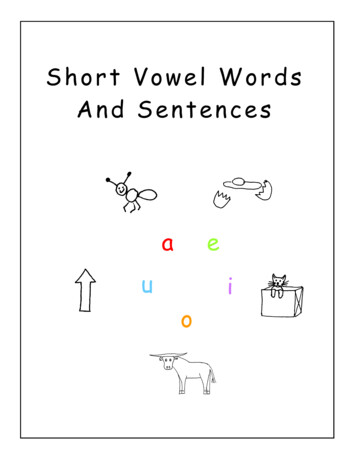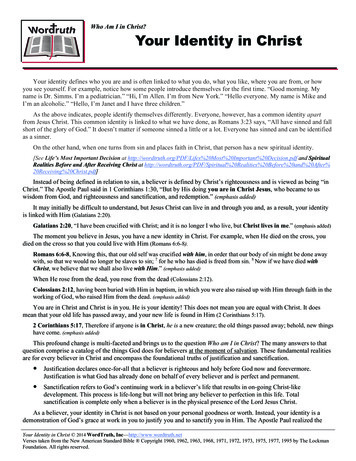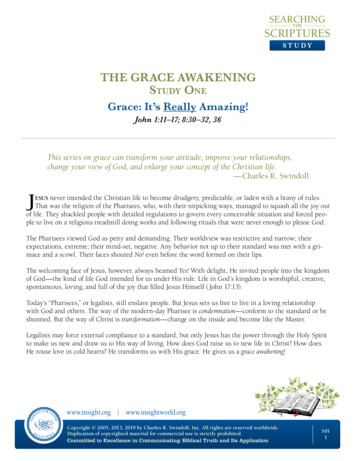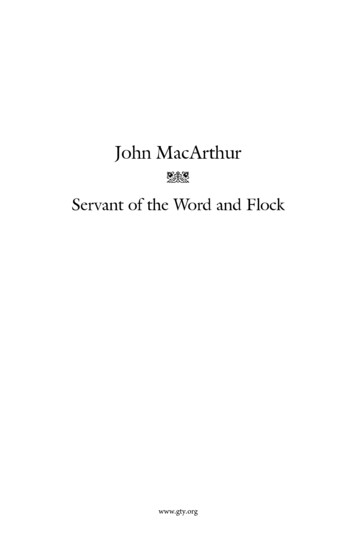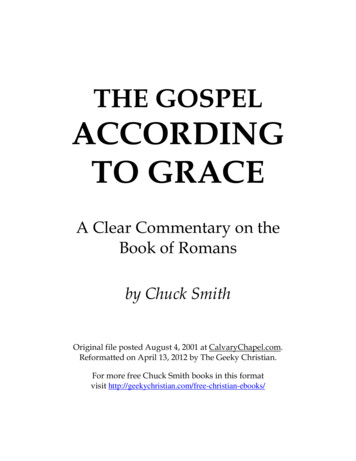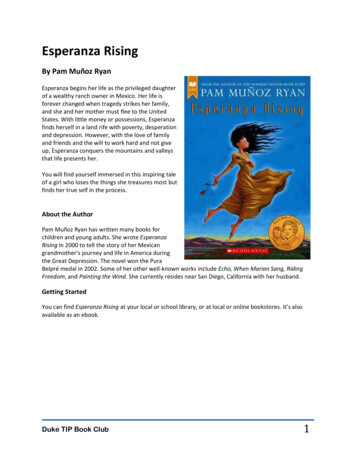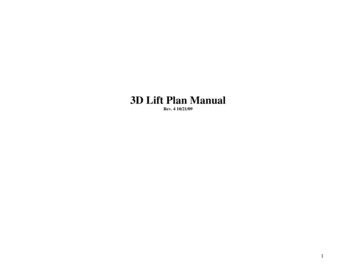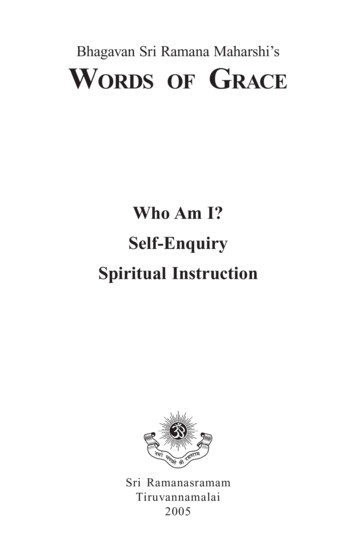
Transcription
Bhagavan Sri Ramana Maharshi’sWORDSOFGRACEWho Am I?Self-EnquirySpiritual InstructionSri RamanasramamTiruvannamalai2005
Sri RamanasramamTiruvannamalaiFirst EditionSecond EditionThird EditionFourth Edition::::196919781996 — 5000 copies2005 — 2000 copiesCC No. 1083ISBN: 81-88018-03-1Price: Rs.Published byV.S. RamananPresidentSri RamanasramamTiruvannamalai 606 603Tamil NaduINDIAEmail: ashram@ramana-maharshi.orgWebsite: www.ramana-maharshi.orgTypeset atSri RamanasramamPrinted bySudarsan GraphicsChennai 600 017
PREFATORY NOTEThe Asramam has published the three well-known worksof Sri Bhagavan, namely Who Am I?, Self-Enquiry and SpiritualInstruction in Tamil in the form of a small volume. An Englishversion of it is now issued for the benefit of devotees who donot know Tamil.Who am I? ( Sôu Vôo?) is a connected exposition of thereplies given by Sri Bhagavan to certain questions put to Himby Sivaprakasam Pillai. Self-Enquiry ( NôW Ne¡WLm) is a similarexposition of the replies given to the questions put byGambhiram Seshayya. Spiritual Instruction (DTúRN UgN )contains the questions put by Natananandar and Sri Bhagavan’sreplies.It is at the request of many western devotees that an essayform of Who Am I? and Self-Enquiry has been retained in thisedition.PUBLISHER
CONTENTSPageW HO A M I? ? . 1SELF-E NQUIRY1.Who Am I? . 172.The Mind . 193.The World . 244.The Ego . 255.The Supreme Being . 276.Knowledge of the Supreme Self . 287.Worship of God . 308.Liberation . 319.The Eightfold Path of Yoga . 3610.The Eightfold Path of Knowledge . 4011.Renunciation . 4212.Conclusion . 43SPIRITUAL INSTRUCTION1.Importance of the Work . 472.Instruction . 483.Practice . 524.Experience . 645.Attainment . 67
Who Am I?
IWHO AM I?EVERY living being longs always to be happy, untaintedby sorrow; and everyone has the greatest love for himself, whichis solely due to the fact that happiness is his real nature. Hence,in order to realise that inherent and untainted happiness, whichindeed he daily experiences when the mind is subdued in deepsleep, it is essential that he should know himself. For obtainingsuch knowledge the enquiry, ‘Who am I?’ in quest of the Self isthe best means.‘WHO AM I?’ I am not this physical body, nor am I the fiveorgans1 of sense perception; I am not the five organs of externalactivity2, nor am I the five vital forces,3 nor am I even thethinking mind. Neither am I that unconscious state of nesciencewhich retains merely the subtle vasanas (latencies of the mind),while being free from the functional activity of the sense-organsand the mind, and being unaware of the existence of the objectsof sense-perception.Therefore, summarily rejecting all the above-mentionedphysical adjuncts and their functions, saying ‘I am not this: no,1The eye, ear, nose, tongue, and skin, with their respective correspondingfunctions of sight, hearing, smell, taste and touch.2The vocal organs that articulate speech and produce sound, hands andfeet that govern the movements of the physical body, anus that excretesfaecal matter, and the genital organ which yields pleasure.3Which control respiration, digestion and assimilation, circulation of blood,perspiration, and excretion.
4Words of Gracenor am I this, nor this’ — that which then remains separate andalone by itself, that pure Awareness is what I am. This Awarenessself is by its very nature Sat-Chit-Ananda, (Being-ConsciousnessBliss).If the mind, which is the instrument of knowledge and isthe basis of all activity, subsides, the perception of the world asan objective reality ceases. Unless the illusory perception of theserpent in the rope ceases, the rope on which the illusion isformed is not perceived as such.4 Similarly, unless the illusorynature of the perception of the world as an objective realityceases, the vision of the true nature of the Self, on which theillusion is formed, is not obtained.The mind is a unique power (sakti) in the Atman wherebythoughts occur to one. On scrutiny as to what remains aftereliminating all thoughts, it will be found that there is no suchthing as mind apart from thought. So then, thoughts themselvesconstitute the mind.Nor is there any such thing as the physical world apartfrom and independent of thought. In deep sleep there are nothoughts: nor is there the world. In the wakeful and dreamstates thoughts are present, and there is also the world. Just asthe spider draws out the thread of the cobweb from within itselfand withdraws it again into itself, in the same way the mindprojects the world out of itself and absorbs it back into itself.The world is perceived as an apparent objective realitywhen the mind is externalized, thereby forsaking its identitywith the Self. When the world is thus perceived, the true natureof the Self is not revealed: conversely, when the Self is realized,the world ceases to appear as an objective reality.4This analogy is based on a traditional story of a man who sees a rope in thetwilight and mistakes it for a serpent and is therefore afraid without cause.
Who Am I?5By a steady and continuous investigation into the natureof the mind, the mind is transformed into That to which the ‘I’refers; and that is in fact the Self. Mind has necessarily to dependfor its existence on something gross; it never subsists by itself. Itis this mind that is otherwise called the subtle body, ego, jiva orsoul.That which arises in the physical body as ‘I’ is the mind. Ifone enquires whence the ‘I’ thought in the body arises in thefirst instance, it will be found that it is from hrdayam5 or theHeart. That is the source and stay of the mind. Or again, evenif one merely continuously repeats to oneself inwardly ‘I-I’ withthe entire mind fixed thereon, that also leads one to the samesource.The first and foremost of all the thoughts that arise in themind is the primal ‘I’-thought. It is only after the rise or originof the ‘I’-thought that innumerable other thoughts arise. Inother words, only after the first personal pronoun, ‘I’, has arisen,do the second and third personal pronouns (‘you, he’, etc.) occurto the mind; and they cannot subsist without the former.Since every other thought can occur only after the rise ofthe ‘I’-thought and since the mind is nothing but a bundle ofthoughts, it is only through the enquiry ‘Who am I?’ that themind subsides. Moreover, the integral ‘I’-thought, implicit insuch enquiry, having destroyed all other thoughts, is itself finallydestroyed or consumed, just as the stick used for stirring theburning funeral pyre is consumed.Even when extraneous thoughts sprout up during suchenquiry, do not seek to complete the rising thought but instead,deeply enquire within, ‘To whom has this thought occurred?’5The word ‘hrdayam’ consists of two syllables, ‘hrt’ and ‘ayam’, (centre-this)which signify ‘I am the Heart’.
6Words of GraceNo matter how many thoughts thus occur to you, if you wouldwith acute vigilance enquire immediately as and when eachindividual thought arises to whom it has occurred, you wouldfind it is to ‘me’. If then you enquire ‘Who am I?’ the mind getsintroverted and the rising thought also subsides. In this manneras you persevere more and more in the practice of Self-enquiry,the mind acquires increasing strength and power to abide in itsSource.It is only when the subtle mind is externalized throughthe activity of the intellect and the sense-organs that gross nameand form constituting the world appear. When, on the otherhand, the mind stays firmly in the Heart, they recede anddisappear. Restraint of the out-going mind and its absorptionin the Heart is known as introversion (antarmukha-drishti).The release of the mind and its emergence from the Heart isknown as extroversion (bahirmukha-drishti).If in this manner the mind becomes absorbed in the Heart,the ego or ‘I’, which is the centre of the multitude of thoughts,finally vanishes and pure Consciousness or Self, which subsistsduring all the states of the mind, alone remains resplendent. Itis this state, where there is not the slightest trace of the‘I’-thought, that is the true Being of oneself. And that is calledQuiescence or Mouna (Silence).This state of mere inherence in pure Being is known asthe Vision of Wisdom. Such inherence means and implies theentire subsidence of the mind in the Self. Nothing other thanthis and no psychic powers of the mind, such as thought reading,telepathy and clairvoyance, can be Wisdom.Atman alone exists and is real. The threefold reality ofworld, individual soul, and God is, like the illusory appearanceof silver in the mother of pearl, an imaginary creation in theAtman. They appear and disappear simultaneously. The Self
Who Am I?7alone is the world, the ‘I’ and God. All that exists is but themanifestation of the Supreme.For the subsidence of mind there is no other means moreeffective and adequate than Self-enquiry. Even though by othermeans the mind subsides, that is only apparently so; it will riseagain.For instance, the mind subsides by the practice ofpranayama (restraint and control of breath and vital forces); yetsuch subsidence lasts only as long as the control of breath andvital forces continues; and when they are released, the mindalso gets released and immediately, becoming externalized, itcontinues to wander through the force of its subtle tendencies.The source of the mind is the same as that of breath andvital forces. It is really the multitude of thoughts that constitutesthe mind; and the ‘I’-thought is the primal thought of the mind,and is itself the ego. But breath too has its origin at the sameplace whence the ego rises. Therefore, when the mind subsides,breath and vital forces also subside; and conversely, when thelatter subside, the former also subsides.Breath and vital forces are also described as the grossmanifestation of the mind. Till the hour of death the mind sustainsand supports these forces in the physical body; and when lifebecomes extinct, the mind envelopes them and carries them away.During sleep, however, the vital forces continue to function,although the mind is not manifest. This is according to the divinelaw and is intended to protect the body and to remove any possibledoubt as to whether it is dead or alive while one is asleep. Withoutsuch arrangement by nature, sleeping bodies would often becremated alive. The vitality apparent in breathing is left behindby the mind as a ‘watchman’. But in the wakeful state and insamadhi, when the mind subsides, breath also subsides. For thisreason (because the mind has the sustaining and controlling power
8Words of Graceover breath and vital forces and is therefore ulterior to both ofthem), the practice of breath-control is merely helpful in subduingthe mind but cannot bring about its final extinction.Like breath-control, meditation on form, incantations,invocations and regulation of diet are only aids to control ofthe mind. Through the practice of meditation or invocation,the mind becomes one-pointed. Just as the elephant’s trunkwhich is otherwise restless, will become steady if it is made tohold an iron chain, so that the elephant goes its way withoutreaching out for any other object, so also the ever-restless mind,which is trained and accustomed to a name or form throughmeditation or invocation, will steadily hold on to that alone.When the mind is split up and dissipated into countlessvarying thoughts, each individual thought becomes extremelyweak and inefficient. When, on the contrary, such thoughtssubside more and more till they finally get destroyed, the mindbecomes one-pointed and, thereby acquiring strength and powerof endurance, easily reaches perfection in the method of enquiryin quest of the Self.Regulation of diet, restricting it to sattvic food6, taken inmoderate quantity, is of all the rules of conduct the best; and itis most conducive to the development of the sattvic qualities7of the mind. These, in their turn, assist one in the practice ofAtma vichara or enquiry in quest of the Self.Countless vishaya-vasanas (subtle tendencies of the mind inrelation to objects of sense-gratification), coming one after theother in quick succession like the waves of the ocean, agitate the6i.e., simple and nutritious food which sustains but does not stimulate thephysical body.7Purity of heart, self-restraint, evenness of temper, tenderness towards allbeings, fortitude and freedom from desire, hatred and arrogance are theoutstanding virtues of the sattvic mind.
Who Am I?9mind. Nevertheless they too subside and finally get destroyedwith progressive practice of Atma dhyana or meditation on theSelf. Without giving room even to the thought which occurs inthe form of doubt, whether it is possible to stay merely as thevery Self, whether all the vasanas can be destroyed, one shouldfirmly and unceasingly carry on meditation on the Self.However sinful a person may be, if he would stop wailinginconsolably: ‘Alas! I am a sinner, how shall I attain Liberation?’and, casting away even the thought that he is a sinner, if hewould zealously carry on meditation on the Self, he would mostassuredly get reformed.So long as subtle tendencies continue to inhere in the mind,it is necessary to carry on the enquiry, ‘Who am I?’As and when thoughts occur, they should, one and all, beannihilated then and there, at the very place of their origin, bythe method of enquiry in quest of the Self.Not to desire anything extraneous to oneself constitutesvairagya (dispassion) or nirasa (desirelessness). Not to give upone’s hold on the Self constitutes jnana (knowledge). But reallyvairagya and jnana are one and the same. Just as the pearl-diver,tying stones to his waist, dives down into the depths, and getsthe pearl from the sea-bed, so every aspirant, pledged to vairagyacan dive deep into himself and realize the precious Atman. Ifthe earnest seeker would only cultivate the constant and deepcontemplative ‘remembrance’ (smrti) of the true nature of theSelf till he has realized it, that alone would suffice. Distractingthoughts are like the enemy in the fortress. As long as they arein possession of it, they will certainly sally forth. But if, as andwhen they come out, you put them to the sword the fortresswill finally be captured.God and the Guru are not really different; they areidentical. He that has earned the Grace of the Guru shall
10Words of Graceundoubtedly be saved and never forsaken, just as the prey thathas fallen into the tiger’s jaws will never be allowed to escape.But the disciple, for his part, should unswervingly follow thepath shown by the Master.Firm and disciplined inherence in the Atman withoutgiving the least scope for the rise of any thought other than thedeep contemplative thought of the Self, constitutes self-surrenderto the Supreme Lord. Let any amount of burden be laid onHim, He will bear it all. It is, in fact, the indefinable power ofthe Lord that ordains, sustains and controls everything thathappens. Why then, should we worry, tormented by vexatiousthoughts, saying: ‘Shall we act this way? No, that way,’ insteadof meekly but happily submitting to that Power? Knowing thatthe train carries all the weight, why indeed should we, thepassengers travelling in it, carry our small individual articles ofluggage on our laps to our great discomfort, instead of puttingthem aside and sitting at perfect ease?That which is Bliss is also the Self. Bliss and the Self arenot distinct and separate but are one and the same. And Thatalone is real. In no single one of the countless objects of themundane world is there anything that can be called happiness.It is through sheer ignorance and unwisdom that we fancy thathappiness is obtained from them. On the contrary, when themind is externalized, it suffers pain and anguish. The truth isthat every time our desires get fulfilled, the mind, turning to itssource, experiences only that happiness which is natural to theSelf. Similarly, in deep sleep, in spiritual trance (samadhi), whenfainting, when a desired object is obtained, or when evil befallsan object considered undesirable, the mind turns inwards andenjoys that Bliss of Atman. Thus wandering astray forsakingthe Self, and returning to it again and again is the interminableand wearisome lot of the mind.
Who Am I?11It is pleasant under the shade of a tree and scorching inthe heat of the sun outside. A person toiling in the sun seeks thecool shade of the tree and is happy under it. After staying therefor a while, he moves out again but, unable to bear the mercilessheat of the sun, he again seeks the shade. In this way he keepson moving from shade to sun and sun to shade.It is an unwise person who acts thus, whereas the wise mannever leaves the shade: in the same way the mind of theEnlightened Sage (jnani) never exists apart from Brahman, theAbsolute. The mind of the ignorant on the other hand, enteringinto the phenomenal world, suffers pain and anguish; and then,turning for a short while towards Brahman, it experienceshappiness. Such is the mind of the ignorant.This phenomenal world, however, is nothing but thought.When the world recedes from one’s view — that is when one isfree from thought — the mind enjoys the Bliss of the Self.Conversely, when the world appears — that is when thoughtoccurs — the mind experiences pain and anguish.Not from any desire, resolve or effort on the part of therising sun, but merely due to the presence of his rays, the lensemits heat, the lotus blossoms, water evaporates, and peopleattend to their various duties in life. In the proximity of themagnet the needle moves. Similarly the soul or jiva, subjectedto the threefold activity of creation, preservation, and destructionwhich takes place merely due to the unique Presence of theSupreme Lord, performs acts in accordance with its karma,8and subsides to rest after such activity. But the Lord Himself hasno resolve; no act or event touches even the fringe of His Being.This state of immaculate aloofness can be likened to that of thesun, which is untouched by the activities of life, or to that of the8i.e., the fruits of past actions which are being worked out in the presentlife.
12Words of Graceall-pervasive ether, which is not affected by the interaction ofthe complex qualities of the other four elements.All scriptures without any exception proclaim that forattaining Salvation, the mind should be subdued; and once oneknows that control of the mind is their final aim, it is futile tomake an interminable study of them. What is required for suchcontrol is actual enquiry into oneself by self-interrogation, ‘Whoam I?’ How can this enquiry in quest of the Self be made merelyby means of a study of the scriptures?One should realize the Self by the Eye of Wisdom. DoesRama need a mirror to recognize himself as Rama? That towhich the ‘I’ refers is within the five sheaths,9 whereas thescriptures are outside them. Therefore, it is futile to seek bymeans of the study of scriptures the Self that has to be realizedby summarily rejecting even the five sheaths.To enquire ‘Who am I that am in bondage?’ and to knowone’s real nature is alone Liberation. To keep the mind constantlyturned within and to abide thus in the Self, is alone Atmavichara (Self-enquiry), whereas dhyana (meditation) consists infervent contemplation of the Self as Sat-Chit-Ananda (BeingConsciousness-Bliss). Indeed, at some time, one will have toforget everything that has been learnt.Just as it is futile to examine the rubbish that has to beswept up only to be thrown away, so it is futile for him whoseeks to know the Self to set to work enumerating the tattvas10that envelop the Self and examining them instead of castingthem away. He should consider the phenomenal world withreference to himself as merely a dream.9These are the physical, vital, and mental sheaths, and the sheaths ofKnowledge-Experience and of Blissful-ignorance.10Tattvas are the elements into which phenomenal existence — from thesubtle mind to gross matter — is classified.
Who Am I?13Except that the wakeful state is long and the dream stateshort, there is no difference between the two. All the activitiesof the dream state appear, for the time being, just as real as theactivities of the wakeful state seem to be while awake. Only,during the dream state, the mind assumes another form or adifferent bodily sheath. For thoughts on the one hand and nameand form on the other occur simultaneously during both thewakeful and dream states.There are not two minds, one good and the other evil. Itis only the vasanas or tendencies of the mind that are of twokinds, good and favourable, evil and unfavourable. When themind is associated with the former it is called good; and whenassociated with the latter it is called evil. However evil-mindedother people may appear to you, it is not proper to hate ordepise them. Likes and dislikes, love and hatred are equally tobe eschewed. It is also not proper to let the mind often rest onobjects or affairs of mundane life. As far as possible one shouldnot interfere in the affairs of others. Everything offered to othersis really an offering to oneself; and if only this truth wererealized, who is there that would refuse anything to others?If the ego rises, all else will also rise; if it subsides, all elsewill also subside. The deeper the humility with which we conductourselves, the better it is for us. If only the mind is kept undercontrol, what matters it where one may happen to be?
Self-Enquiry
IIS ELF - E NQUIRYELFNQUIRYC HAPTER IWHO AM I ?In this chapter is given clearly the path ofenquiry into the Self, or ‘Who Am I?’Is not the sense of ‘I’ natural to all beings, expressed in alltheir feelings as ‘I came’, ‘I went’, ‘I did’, or ‘I was’? Onquestioning what this is, we find that the body is identified with‘I’ because movements and similar functions pertain to the body.Can the body then be this ‘I-consciousness’? It was not therebefore birth, it is composed of the five elements, it is absent1 insleep, and it (eventually) becomes a corpse. No, it cannot be.This sense of ‘I’, which arises in the body for the time being, isotherwise called the ego, ignorance, illusion, impurity, orindividual self. The purpose of all the scriptures is this enquiry(into the Self ). It is declared in them that the annihilation ofthe ego-sense is Liberation. How then can one remainindifferent to this teaching? Can the body, which is insentientas a piece of wood, shine and function as ‘I’? No. Therefore, layaside this insentient body as though it were truly a corpse. Do1i.e. from our awareness.
18Words of Gracenot even murmur ‘I’, but enquire keenly within what it is thatnow shines within the heart as ‘I’. Underlying the unceasingflow of varied thoughts, there arises the continuous, unbrokenawareness, silent and spontaneous, as ‘I-I’ in the Heart. If onecatches hold of it and remains still, it will completely annihilatethe sense of ‘I’ in the body, and will itself disappear as a fire ofburning camphor. Sages and scriptures proclaim this to beLiberation.The veil of ignorance can never completely hide the self.How can it? Even the ignorant do not fail to speak of the ‘I’. Itonly hides the Reality, ‘I-am-the-Self ’, or ‘I-am-pureConsciousness’, and confounds the ‘I’ with the body.The Self is self-effulgent. One need give it no mentalpicture, anyway. The thought that imagines it is itself bondage,because the Self is the Effulgence transcending darkness andlight; one should not think of it with the mind. Such imaginationwill end in bondage, whereas the Self spontaneously shines asthe Absolute. This enquiry into the Self in devotional meditationevolves into the state of absorption of the mind into the Selfand leads to Liberation and unqualified Bliss. The great sageshave declared that only by the help of this devotional enquiryinto the Self can Liberation be attained. Because the ego in theform of the ‘I-thought’ is the root of the tree of illusion, itsdestruction fells illusion, even as a tree is felled by the cutting ofits roots. This easy method of annihilating the ego is alone worthyto be called bhakti (devotion), jnana (knowledge), yoga (union),or dhyana (meditation).In the ‘I-am-the-body’ consciousness, the three bodies2composed of the five sheaths3 are contained. If that mode of2i.e., the physical, subtle and causal — of the waking, dreamand sleep states respectively.3i.e. the gross, sensory, mental, intellectual and blissful.
Self-Enquiry19consciousness is removed all else drops off of its own accord; allother bodies depend on it. There is no need to eliminate themseparately because the scriptures declare that thought alone isbondage. It is their final injunction that the best method is tosurrender the mind in the form of the ‘I’-thought to Him (theSelf ), and, keeping quite still, not forget Him.C HAPTER IITHE MINDIn this chapter are described briefly the nature of themind, its states and locationAccording to the Hindu scriptures an entity known as the‘mind’, is derived from the subtle essence of the food consumed;which flourishes as love, hatred, lust, anger, and so on; which isthe totality of mentality, intellect, desire, and ego; which, althoughit has such diverse functions, bears the generic name ‘mind’, whichis objectified as the insentient objects cognized by us; which,though itself insentient, appears to be sentient, being associatedwith Consciousness, just as a piece of red-hot iron appears to befire; in which the principle of differentiation is inherent; which istransient and is possessed of parts capable of being moulded intoany shape like lac, gold, or wax; which is the basis of all rootprinciples (tattvas); which is located in the Heart like sight in theeye and hearing in the ear; which gives its character to theindividual self and which, on thinking of the object alreadyassociated with the consciousness reflected on the brain, assumesa thought-form; which is in contact with that object through thefive senses operated by the brain, which appropriates suchcognizance to itself with the feeling ‘I am cognizant of such andsuch’, enjoys the object and is finally satisfied.
20Words of GraceTo think whether a certain thing may be eaten is a thoughtform of the mind. ‘It is good. It is not good. It can be eaten. Itcannot be eaten’; discriminating notions like these constitutethe discriminative intellect. Because the mind alone constitutesthe root-principle manifesting as the three entities of ego, God,and world, its absorption and dissolution in the Self is the finalemancipation known as kaivalya, which is the same as Brahman.The senses, being located externally as aids for thecognition of objects, are exterior; the mind, being internal, isthe inner sense. ‘Within, and without’ are relative to the body;they have no significance in the Absolute. For the purpose ofshowing the whole objective world to be within, and notwithout, the scriptures have described the cosmos as being shapedlike the lotus of the Heart. But that is not other than the Self.Just as the goldsmith’s wax ball, although hiding minute specksof gold, still looks like a simple lump of wax, so too all theindividuals merged in dark ignorance (avidya), or the universalveiling (maya), are only aware of nescience in their sleep. Indeep sleep the physical and subtle bodies, though entering inthe dark veiling, still lie merged in the Self. From ignorancesprang the ego — the subtle body. The mind must betransformed into the Self.Mind is, in reality, only consciousness, because it is pureand transparent by nature: in that pure state, however, it cannotbe called mind. The wrong identification of one thing withanother1 is the work of the contaminated mind. That is to say,1i.e. The mistaken view that attributes the Reality of the Self to thematerial world as existing by itself independent of the consciousprinciple. This is due to the false identification of the Self with thephysical body, as a result of which the ignorant person assumes thatwhat is outside and independent of the physical body is also outsideand independent of the conscious principle.
Self-Enquiry21the pure, uncontaminated mind, being absolute Consciousness,on becoming oblivious of its primary nature, is overpoweredby the quality of darkness (tamas) and manifests as the physicalworld. Similarly, over-powered by activity (rajas), it identifiesitself with the body and, appearing in the manifested world as‘I’, mistakes this ego for the reality. Thus, swayed by love andhatred, it performs good and bad actions, and is, as the result,caught up in the cycle of births and deaths. It is the experienceof everyone that in deep sleep and in a faint he has no awarenessof his own Self or of objectivity. Later the experience ‘I wokeup from sleep’, ‘I regained consciousness’, is the distinctiveknowledge born of the natural state. This distinctive knowledgeis called vijnana. It shines not by itself but by always adheringeither to the Self or the non-Self. When it inheres in the Self, itis called true Knowledge; it is awareness of the mental mode inthe Self, or perpetual awareness; and when this distinctiveknowledge combine
8 Words of Grace over breath and vital forces and is therefore ulterior to both of them), the practice of breath-control is merely helpful in subduing the mind but cannot bring about its final extinction. Like breath-control, meditation on form, incantations, invocations and

